Can makeup, jewelry, and lipsticks coexist with our faith?
Are you curious about what the Bible has to say? You’re not alone in this quest.
In today’s post, we’ll dive into Bible verses about wearing makeup, jewelry, and lipsticks.
We’ll unravel this hot topic and guide you on balancing personal style with spiritual values.
“Beauty begins the moment you decide to be yourself,” Coco Chanel once declared. So, let’s embark on this captivating journey together.
We’ll uncover the Bible’s insights, just for you, to make informed beauty choices.
Ready? Let’s go!
Bible verses about wearing makeup, jewelry, and lipsticks.
1 Timothy 2:9-10.
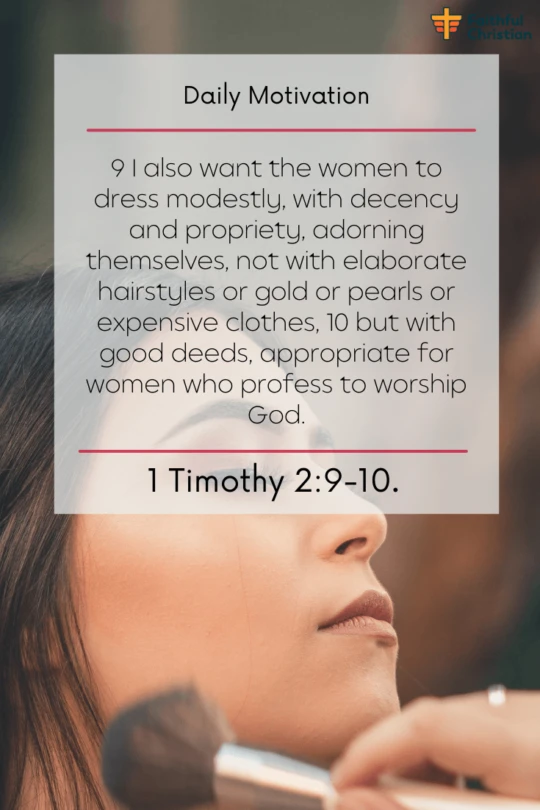
9 I also want the women to dress modestly, with decency and propriety, adorning themselves, not with elaborate hairstyles or gold or pearls or expensive clothes, 10 but with good deeds, appropriate for women who profess to worship God.
The Good news
1 Timothy 2:9 emphasizes the importance of modesty in every aspect of our lives.
This scripture, which advises against the showy display of expensive jewelry, transcends the realm of physical appearance.
It beckons us to examine our attitudes, actions, and priorities, inspiring us to keep our hearts anchored in Jesus and our unwavering service to God.
Living with moderation empowers us to place our spiritual well-being above the pursuit of external beauty.
By wholeheartedly embracing modesty, we become acutely aware of our dedication to God, gradually distancing ourselves from the temptation to seek the world’s approval.
It’s essential to understand that this verse does not inherently denounce the use of makeup, lipstick, or jewelry.
Instead, it encourages us to exercise wisdom in our choices and prioritize the most essential aspects of our Christian journey.
1 Timothy 2:10 gently reminds us that our lives should revolve around good deeds, rather than external adornments. Psalms 149:4 and 147:11 highlight that God values those who respect Him and trust in His unwavering love.
Together, these verses beautifully illustrate the importance of nurturing inner beauty and a heart dedicated to serving God and His people.
The tale of Queen Esther (Esther 2:12-17) masterfully exemplifies the delicate balance between inner and outer beauty.
Renowned for her enchanting appearance, Esther also embodied a courageous and altruistic spirit.
After completing twelve months of beauty treatments, she was presented to King Ahasuerus, who ultimately chose her as his queen.
Yet, her true beauty emanated from her unshakable faith and commitment to rescuing her people from impending doom.
Esther’s story illuminates the transformative power of a heart devoted to God’s purpose, even in a world consumed by physical beauty.
In a world that incessantly glorifies external appearances, 1 Timothy 2:9 serves as a timely reminder to maintain our focus on spiritual growth and service to God.
Our ultimate destiny depends on our deeds in God’s service rather than our physical appearance.
As Christians, we should focus on loving others, nurturing our relationships, and serving God daily.
Through this commitment, we will make a lasting impact on the world and radiate the genuine beauty that blossoms from a heart devoted to God.
1 Peter 3:3-5.
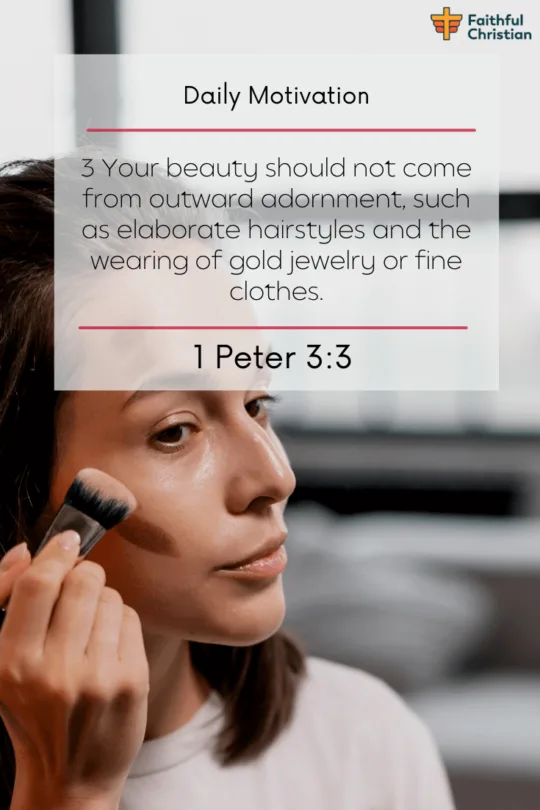
3 Your beauty should not come from outward adornment, such as elaborate hairstyles and the wearing of gold jewelry or fine clothes.
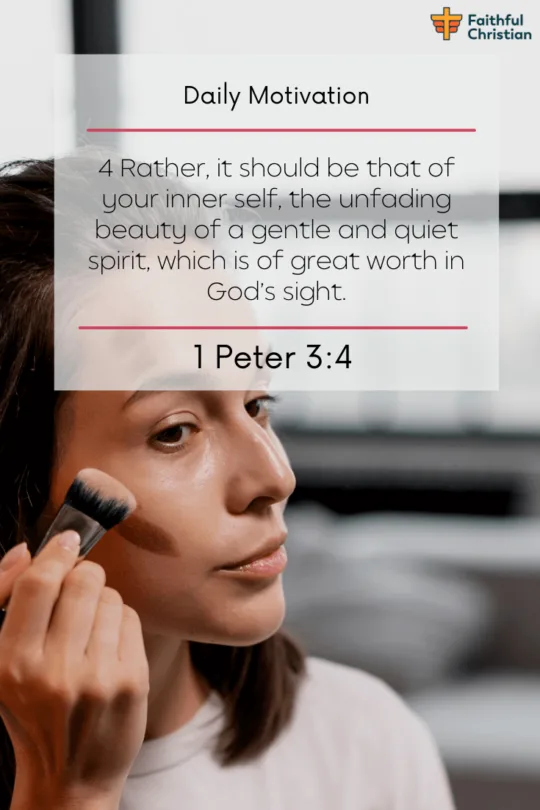
4 Rather, it should be that of your inner self, the unfading beauty of a gentle and quiet spirit, which is of great worth in God’s sight.
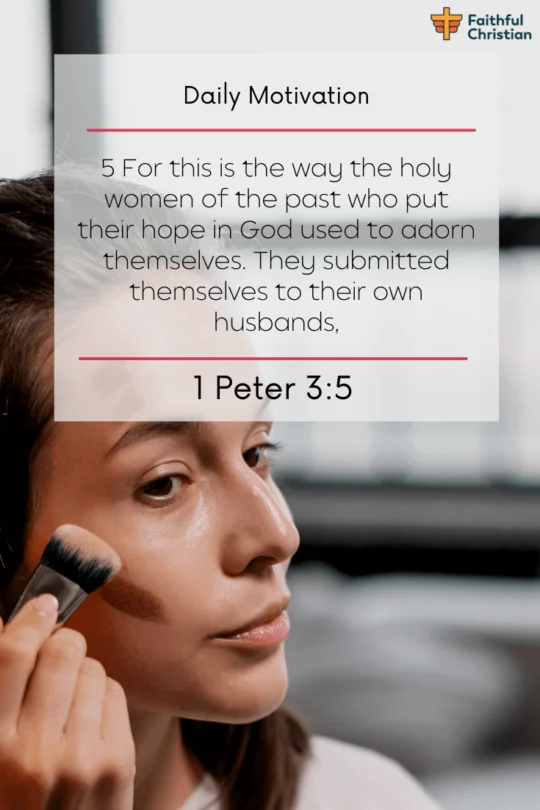
5 For this is the way the holy women of the past who put their hope in God used to adorn themselves. They submitted themselves to their own husbands,
The Good news
As we navigate the winding path of life, many of us seek to uncover the essence of true beauty and the significance it holds in our service to the Divine.
Is it vital to present our best selves outwardly and invest in our physical appearance?
Or should we transcend these external concerns and dedicate our energies solely to spiritual growth?
In reality, there is no wrongdoing in looking our best and taking pride in our appearance.
It is a natural expression of our unique identity to appreciate and utilize fine perfumes, lipstick, or jewelry as a means of self-expression and confidence-building.
Caring for our external selves is a celebration of the magnificent creations that we are.
Yet, amid this celebration, it is of utmost importance not to lose sight of what holds eternal value in the eyes of our Creator.
Our outward beauty, the makeup we wear, and the jewelry we choose bear no weight in the quest for salvation.
What captivates the heart of God is the radiant essence nestled deep within our souls: our inner beauty.
So, how do we define inner beauty, and how can we nurture it to gleam in the divine light?
Inner beauty encompasses our personality, character, devotion to God, and steadfast dedication to His commandments. This sacred, ethereal glow is the core of our being.
Furthermore, 1 Peter 3:3-5 tenderly reminds us that a woman’s beauty should stem from her inner self, not from external adornments like intricate hairstyles, gold jewelry, or lavish attire.
In 1 Peter 3:4, the scripture highlights the value of cultivating a gentle and quiet spirit, which is infinitely precious in God’s sight.
Additionally, Romans 12:2 highlights the importance of spiritual growth, encouraging us to renew our minds rather than conform to worldly patterns.
In contrast, Revelation 17:4 depicts the Great Harlot as a figure adorned with luxurious clothing, jewelry, and precious stones, symbolizing corruption and idolatry.
Though her external appearance is alluring, she embodies the corruption and idolatry of earthly kingdoms.
This serves as a potent reminder that fixating on material possessions and outward beauty can lead us away from the path of righteousness and authentic spiritual fulfillment.
The scriptures beckon us to prioritize our inner beauty, allowing it to radiate brilliantly in a world yearning for the warmth of love, compassion, and devotion.
By fostering our inner luminescence, we can profoundly impact the world, reflecting God’s light through our deeds, words, and spirits.
Let us commit to cultivating our inner beauty and strive to light the way to salvation for ourselves and those who walk alongside us on this radiant journey.
Titus 2:3-5.

3 Likewise, teach the older women to be reverent in the way they live, not to be slanderers or addicted to much wine, but to teach what is good.

4 Then they can urge the younger women to love their husbands and children, 5 to be self-controlled and pure, to be busy at home, to be kind, and to be subject to their husbands, so that no one will malign the word of God.
In today’s world, we can easily be captivated by makeup, jewelry, and lavish lifestyles.
While God does not condemn these adornments, His true concern rests upon the way we conduct ourselves among others.
Our main goal should be to impact the world positively by embracing godly grace and humility, with guidance from the Bible in Titus 2:3-5 and 1 Timothy 3:11.
Titus 2:3-5 inspires older women to be beacons of godliness, urging them to guide younger women in loving their husbands and children, embracing self-control, purity, and modesty.
This counsel extends beyond our actions to encompass how we present ourselves to the world.
By choosing modest attire and nurturing our inner beauty, we can glorify God and create a positive ripple effect in the world around us.
1 Timothy 3:11 advises women to embody dignity, refrain from slander, and be faithful in all their endeavors.
These virtues are the cornerstones of a godly life that radiates divine light, inspiring others to seek the warmth and love of God’s embrace.
The story of the adulteress in Proverbs 7:10 warns against the risks of solely focusing on external beauty.
Her seductive charm and captivating appearance lead men astray, illustrating the potential devastation wrought by an ungodly preoccupation with external allure.
As we adorn ourselves, let us pause to consider: Are we honoring God through our attire and disposition?
By embracing moderation and prioritizing our inner beauty, we will always find ourselves on the right path.
In closing, the Bible reminds us that makeup and adornments hold no bearing on our salvation.
Rather than becoming fixated on our outward appearance, let us devote ourselves to cultivating kindness, assisting those in need, and honoring our spouses.
By grounding ourselves in God’s love, our inner beauty will flourish, and we will become inspiring beacons of hope in the world.
Psalm 149:4.

For the Lord takes delight in his people; he crowns the humble with victory.
Psalm 149:4, a profound verse from the Bible, implores us to embody humility and purpose, transcending the superficialities of our outward appearance.
The scripture emphasizes the importance of developing humility in all aspects of life.
Additionally, it encourages focusing on the fundamental principles of the Christian faith.
As we do so, we must consistently assess our actions, ensuring they resonate with God’s will and steer clear of sin.
God rejoices in those who are steadfast in their devotion to His word and prioritize what truly matters.
These vital principles include repentance, forgiveness, and unwavering perseverance in the noble battle of faith.
As we dedicate ourselves to upholding God’s commandments, He takes delight in us and proudly calls us “His people.”
Moreover, Psalm 147:11 highlights that God finds joy in those who revere and honor Him, placing their trust in His unfailing love and mercy.
Furthermore, Proverbs 11:20 underscores that God treasures individuals who lead a righteous life and disapproves of those harboring impure motives.
Jezebel, an infamous biblical figure, exemplifies the perils of concentrating solely on outward beauty and manipulative prowess (2 Kings 9:30).
Recognized for her extravagant makeup and adornments, Jezebel employed her charm and cunning schemes to dominate and deceive those around her.
Driven by selfish ambition and idolatry, her actions ultimately led to her demise.
This poignant tale accentuates the significance of nurturing inner beauty and fostering a relationship with God, anchored in humility, love, and faith.
By giving precedence to these virtues, we can profoundly impact the world as we align ourselves with God’s divine plan.
Psalm 149:4 and the related scriptures serve as compelling reminders to concentrate on the essential aspects of our Christian journey.
Our actions should emanate from a spirit of humility and dedication to God, striving to positively influence the world through our faith and inner beauty.
Jeremiah 4:30.

What are you doing, you devastated one?Why dress yourself in scarletand put on jewels of gold? Why highlight your eyes with makeup?You adorn yourself in vain. Your lovers despise you;they want to kill you.
To truly serve God and become a beacon of inspiration in the world, we must earnestly seek to comprehend His will and wholeheartedly embrace His commandments.
These divine instructions embody the essence of simplicity and focus on the foundational principles of loving our neighbors as ourselves and cherishing God with every ounce of our being.
By nurturing a life rooted in righteousness and placing our spiritual well-being at the forefront, we can forge a deeper connection with our Creator and stride boldly on the path toward eternal salvation.
As the Apostle Paul so poetically expressed, the entirety of God’s laws can be distilled into the heartfelt act of loving our neighbors as ourselves.
Guided by this profound wisdom, we are called to examine our preoccupation with external beauty and its relevance to our spiritual journey.
Do opulent jewels and elaborate makeup truly hold any significance in our pursuit of divine approval and eternal salvation?
Reflecting on the biblical account of Queen Vashti (Esther 1:10-12) offers valuable insight.
Renowned for her captivating beauty, Vashti was called upon by King Ahasuerus to showcase her allure before his guests.
Queen Vashti’s refusal to showcase her beauty resulted in her exile from the kingdom.
This poignant tale reminds us of the transient nature of outward beauty and highlights the virtues of humility and modesty.
While wearing makeup and jewelry is not inherently wrong, we must always prioritize the fundamental principle of God’s laws: loving our neighbors as ourselves.
By dedicating ourselves to cultivating inner beauty and emanating the love of God, we can create a lasting, positive impact on the world and draw nearer to the divine purpose that beckons us.
Isaiah 3:16.

The Lord says,“The women of Zion are haughty, walking along with outstretched necks,flirting with their eyes, strutting along with swaying hips,with ornaments jingling on their ankles.
In a world that often relies on makeup, jewelry, and lipstick to enhance attractiveness and garner attention, it’s essential to recognize that focusing solely on external beauty might impede our spiritual growth and connection with God.
Delving into the profound meanings behind biblical passages like Isaiah 3:16, Ezekiel 16:49-50, and Proverbs 30:13, we can uncover the immense value of embracing inner beauty and spiritual development.
Isaiah 3:16 depicts the daughters of Zion, whose haughty eyes and captivating swaying hips, adorned with exquisite jewelry and luxurious attire, serve as a powerful reminder that fixating on outward appearances can foster vanity and arrogance. This ultimately distracts us from our sacred purpose: to serve God and adhere to His commandments.
Ezekiel 16:49-50 reveals the sins of Sodom, encompassing pride, gluttony, and idleness. This passage underscores the perils of becoming engulfed in self-importance, as it may lead to the abandonment of our spiritual duties and empathy for others.
Proverbs 30:13 emphasizes the significance of humility, cautioning against those who disdainfully gaze upon others. This verse illuminates the truth that authentic beauty resides in a humble and gracious spirit, transcending superficial embellishments.
The tale of Eve in Genesis 3:6 demonstrates the consequences of succumbing to the allure of outward appearances.
Enticed by the serpent, Eve found the forbidden fruit visually appealing, leading her to defy God’s command.
This pivotal moment in the Bible serves as a potent warning about the potential hazards of being captivated by external beauty.
In a world preoccupied with outward appearances, we must remember that the true essence of beauty dwells within.
By cultivating inner beauty, humility, and our bond with God, we can radiate a divine light that outshines even the most dazzling makeup, jewelry, or lipstick.
Embracing our divine radiance empowers us to illuminate the world with love, grace, and a spirit that is eternally beautiful.
2 Kings 9:30.

30 Then Jehu went to Jezreel. When Jezebel heard about it, she put on eye makeup, arranged her hair and looked out of a window.
2 Kings 9:30 reminds us not to focus on less important aspects of our faith, such as the items associated with Jezebel.
Instead, we should prioritize cultivating our inner beauty and improving our relationship with God.
Our outward looks will never prevent God’s judgment, and we must strive to grow spiritually every day.
Matthew 6:28-29.

28 “And why do you worry about clothes? See how the flowers of the field grow. They do not labor or spin. 29 Yet I tell you that not even Solomon in all his splendor was dressed like one of these.
Matthew 6:28-29 advises us not to worry about our looks or material possessions. Instead, we should focus on seeking God first and foremost.
In doing so, we can trust in God’s divine provision, freeing ourselves from the burden of worry over our looks or possessions.
Jeremiah 2:32.

Does a young woman forget her jewelry,a bride her wedding ornaments? Yet my people have forgotten me,days without number.
Jeremiah 2:32 highlights the importance of cosmetics in women’s lives but reminds us that our priority should be our relationship with God.
By taking our faith seriously and concentrating on His will, we can strike a balance between enjoying the pleasures of life and nurturing our spiritual growth.
Genesis 24:53.

53 Then the servant brought out gold and silver jewelry and articles of clothing and gave them to Rebekah; he also gave costly gifts to her brother and to her mother.
Genesis 24:53 demonstrates that there is nothing inherently wrong with using makeup or jewelry.
The key is to remain focused on our ultimate purpose: serving God and following His commandments.
By maintaining a balanced perspective on beauty, we can enjoy life’s pleasures while remaining grounded in our faith.
Isaiah 3:18-24.

18 In that day the Lord will snatch away their finery: the bangles and headbands and crescent necklaces, 19 the earrings and bracelets and veils, 20 the headdresses and anklets and sashes, the perfume bottles and charms,

21 the signet rings and nose rings, 22 the fine robes and the capes and cloaks, the purses 23 and mirrors, and the linen garments and tiaras and shawls.
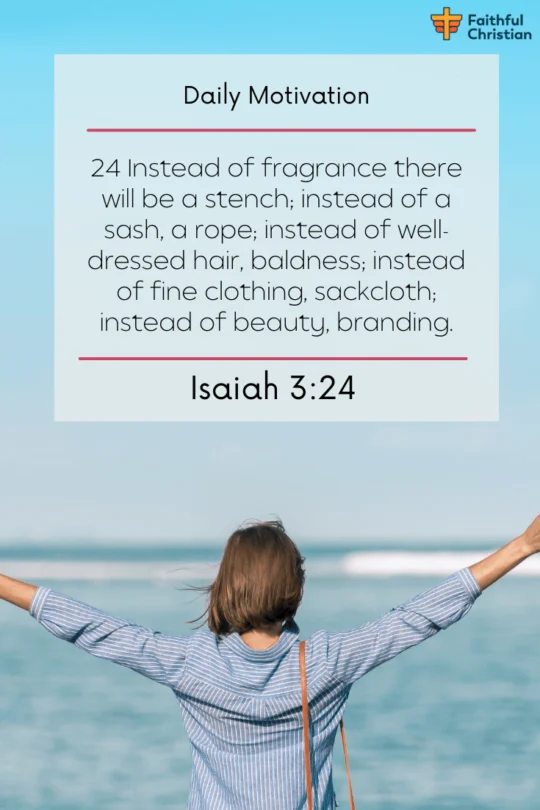
24 Instead of fragrance there will be a stench;instead of a sash, a rope; instead of well-dressed hair, baldness;instead of fine clothing, sackcloth;instead of beauty, branding.
Isaiah 3:18-24 emphasizes that God’s judgment is based on our deeds.
Our physical appearance plays no role in how He evaluates our worthiness.
On the day of Judgment, our physical beauty will not matter. This passage reminds us to prioritize our spiritual growth and commit ourselves to serving God and others.
Deuteronomy 22:5.

5 A woman must not wear men’s clothing, nor a man wear women’s clothing, for the Lord your God detests anyone who does this.
Deuteronomy 22:5 highlights that adornments are used by both men and women and are not inherently sinful.
The key is to maintain a balanced perspective between appreciating our physical beauty and nurturing our inner beauty.
By prioritizing our spiritual growth and divine connection, we can embrace our outward appearance without compromising our commitment to God.
Proverbs 31:30.
Proverbs 31:30 highlights the importance of fearing the Lord and prioritizing inner beauty over physical attractiveness.
A woman who fears the Lord and walks in His ways is far more valuable than one who merely relies on her outward appearance.
By focusing on our spiritual growth and developing a strong relationship with God, we can cultivate a beauty that outshines any makeup, jewelry, or lipstick.
Deuteronomy 18:12.
Proverbs 1:7.
Proverbs 11:22.
1 Peter 1:7.
Song of Solomon 4:7.
Frequently Asked Question
What makes a woman beautiful according to the Bible?
The Bible teaches that true beauty lies within a woman’s character and inner virtues.
Proverbs 31:30 highlights the value of a woman who fears the Lord, while 1 Peter 3:3-4 reveals that genuine beauty springs from a gentle and quiet spirit, which is precious in God’s eyes.
What does the Bible say about women’s adornment?
Scripture encourages modesty in women’s attire and emphasizes the importance of good deeds.
1 Timothy 2:9-10 urges women to dress with decency, prioritizing inner virtues over elaborate hairstyles or expensive clothing.
Similarly, 1 Peter 3:3-4 advises focusing on inner beauty rather than external appearances.
Where in the Bible does it talk about a woman’s beauty?
The Bible discusses women’s beauty in various passages.
Proverbs 31:30 highlights the importance of fearing the Lord, Song of Solomon celebrates love and beauty between a couple, and 1 Peter 3:3-4 focuses on the inner qualities valued by God.
What book in the Bible talks about makeup?
While no specific book in the Bible is dedicated to makeup, cosmetics are mentioned in passages like 2 Kings 9:30, where Jezebel applies makeup before meeting Jehu.
Generally, Scripture encourages modesty and places greater importance on inner beauty.
Who was the first woman to wear makeup in the Bible?
Jezebel is likely the first woman mentioned wearing makeup in the Bible.
2 Kings 9:30 describes her painting her eyes and styling her hair before meeting Jehu.
The Bible neither explicitly endorses nor condemns makeup, instead emphasizing inner beauty and modesty.
What does the Bible say about lips?
Lips are often metaphorically used in the Bible to stress the power of speech and the significance of using words wisely.
Proverbs 12:18 and 16:24 remind us to choose words that heal and encourage, highlighting the positive impact of gracious speech.
What does the Bible say about beauty and appearance?
Scripture primarily focuses on inner beauty and character rather than external appearances.
1 Samuel 16:7 teaches that God looks at the heart, not outward appearance.
1 Peter 3:3-4 reiterates the importance of inner beauty, valuing a gentle and quiet spirit above physical attractiveness.
